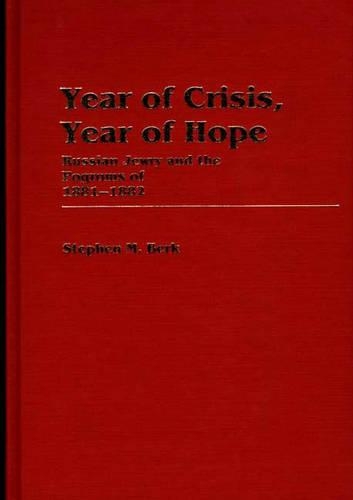
Year of Crisis, Year of Hope: Russian Jewry and the Pogroms of 1881-1882
(Hardback)
Publishing Details
Year of Crisis, Year of Hope: Russian Jewry and the Pogroms of 1881-1882
By (Author) Stephen M. Berk
Bloomsbury Publishing PLC
Praeger Publishers Inc
22nd August 1985
United States
Classifications
Tertiary Education
Non Fiction
Social groups: religious groups and communities
947.004924
Physical Properties
Hardback
231
Width 152mm, Height 229mm
539g
Reviews
A balanced, intelligent study, this history examines the events leading to the massive pogroms against Russian Jewry between 1881-82, crystallizes the Russian and Jewish responses to them, and assesses the impact pogroms had on the course of Russian and American Jewish history and on the Jewish national movement. Berk carefully evaluates the varying shades of Jewish reaction to Russian liberalization and Russification during the 1860s and 1870s, making Jewish trauma in the 1880s better understood. Judiciously weighing different theories about the reasons and character of the pogroms, Berk concludes that they were spontaneous, urban riots that spread to the country rather than centrally organized attacks perpetrated mostly by peasants. Berk is acutely perceptive and original in demonstrating the heterogeneity of Russian reactions to the pogroms, highlighting differing responses of government officials, revolutionaries, and intellectuals. His analysis of Russian Jewish emigration and resettlement in America, although less innovative, nicely rounds out the book. Based on a wealth of primary sources, especially periodicals, and concluding with a useful bibliographical essay, this book is academically rigorous, informative, and a pleasure to read. For all audiences.-Choice
"A balanced, intelligent study, this history examines the events leading to the massive pogroms against Russian Jewry between 1881-82, crystallizes the Russian and Jewish responses to them, and assesses the impact pogroms had on the course of Russian and American Jewish history and on the Jewish national movement. Berk carefully evaluates the varying shades of Jewish reaction to Russian liberalization and Russification during the 1860s and 1870s, making Jewish trauma in the 1880s better understood. Judiciously weighing different theories about the reasons and character of the pogroms, Berk concludes that they were spontaneous, urban riots that spread to the country rather than centrally organized attacks perpetrated mostly by peasants. Berk is acutely perceptive and original in demonstrating the heterogeneity of Russian reactions to the pogroms, highlighting differing responses of government officials, revolutionaries, and intellectuals. His analysis of Russian Jewish emigration and resettlement in America, although less innovative, nicely rounds out the book. Based on a wealth of primary sources, especially periodicals, and concluding with a useful bibliographical essay, this book is academically rigorous, informative, and a pleasure to read. For all audiences."-Choice
